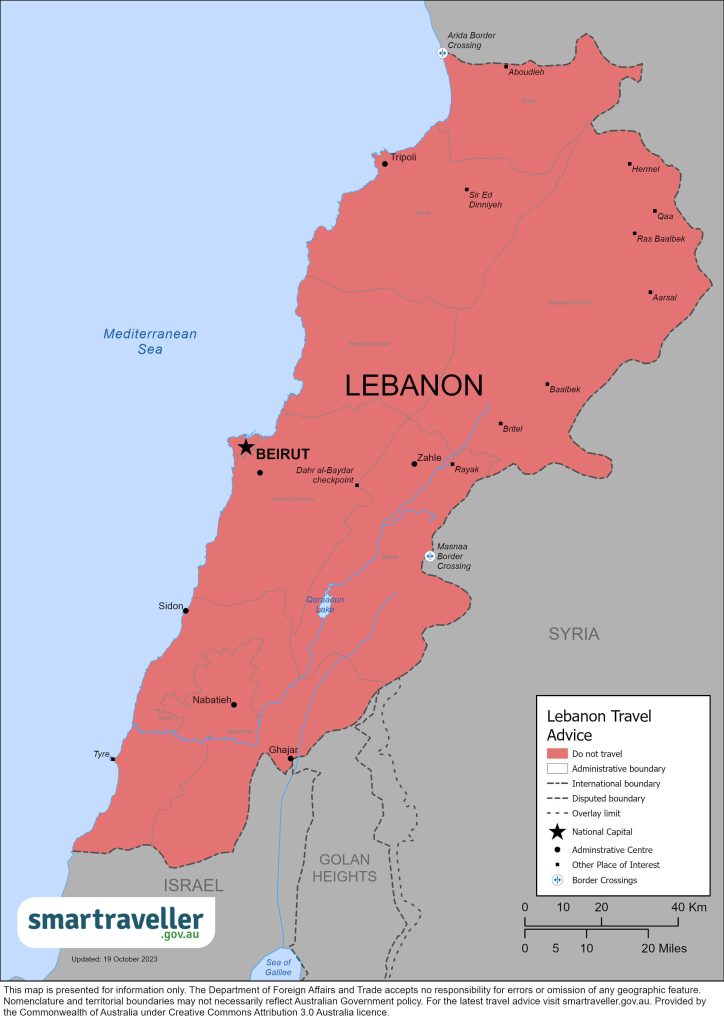The security situation in the region remains unpredictable and could deteriorate with little or no warning.
Political changes in the region and international events can cause large protests or violence. Planned and on-site events may take place.
Anti-government demonstrations take place. Protests may target key institutions and sites, including banks. Some can be large-scale and degenerate into violent clashes between demonstrators and security forces.
Authorities are using various measures to disperse crowds, including:
- water cannons
- tear gas
- live ammunition
These measures caused injuries.
Public demonstrations and events that attract large groups of people can become violent or even involve weapons. You could be the victim of violence directed against others.
During civil unrest and periods of heightened tension:
- avoid all crowds, demonstrations and demonstrations
- pay special attention to your personal safety
- monitor media and other sources for information on planned and possible actions
- avoid areas where violence has occurred or is likely to occur
- plan your activities to avoid potential unrest on days of national importance
- be prepared to change your travel plans in the event of disruptions
If you are in an area affected by clashes:
- stay indoors and away from windows and balconies
- follow the advice of local authorities
Stay indoors during celebratory shootings, which have caused casualties, and often occur during and after political speeches, weddings, funerals, and religious and New Year's holidays.
If transportation disruptions affect your travel plans, contact your airline, travel agent or insurer for assistance.
Leave Lebanon if you fear for your safety.
More information:
Beirut
During times of civil unrest, avoid areas of Beirut where protests are known to occur.
In Beirut, protests sometimes close major highways. It is common to burn tires to block main roads. Groups are protesting:
- government policies
- the situation in Syria
- the security environment
- the deterioration of the social and economic situation
Civil unrest may affect highways between central Beirut and the international airport. Armed clashes took place in certain neighborhoods of Beirut.
Southern suburbs (Dahiyeh region) of Beirut
Do not go to the Dahiyeh region, in particular:
- the area located south of the Camille Chamoun sports stadium to the airport (south of Adnon El Hakim road to Abbas El Mousawi road). This includes the suburbs of Chiyah, Ghobeire, Haret Hreik, Bir el Abed, Borj el Barajne, Mraije, Roueiss, Lailake, Hay el Sellom, Tahouitit el Ghadir and Bir Hassan.
- east of airport highway
- west of the airport highway to El Akhtal El Saghir road and south of the Coral Beach Hotel.
This area does not include the main airport highway (Hafez El Assad).
Security in the area is still unstable. You could be caught in violent attacks between armed groups. Terrorist attacks may occur.
Palestinian refugee camps
Do not visit Palestinian refugee camps in any part of Lebanon.
Extremist groups operate inside the camps. The security situation is uncertain and could worsen without warning.
The Lebanese state has no official security presence in the camps. Armed clashes between rival groups occur. Violent crimes are common.
Also avoid the surrounding areas of camps in case of increased tension or armed clashes. Lost ammunition caused casualties.
Tripoli and northern Lebanon
Do not go to the Jabal Mohsen and Bab-al-Tabbaneh neighborhoods in Tripoli. The violent clashes that took place at the start of the Syrian conflict left more than 200 people dead. The risk of civil unrest remains high and can become violent.
In 2019, a lone wolf terrorist attack in Tripoli killed 4 members of the security services.
Lebanese authorities say extremists have taken refuge in northern Lebanon, particularly throughout the Akkar district.
Northeast Bekaa Valley
Do not go to the northeastern Bekaa Valley region, which extends east and north of Rayak. This includes:
- Hermel-Baalbek region
- the towns of Arsal, El Qaa and Ras Baalbek
Clashes between Lebanese security forces and militants are possible.
Other parts of the Beka'a Valley
Be particularly careful in the Beka'a Valley, south of Zahle and Rayak, where the security environment is uncertain.
In August 2016, a homemade bomb exploded in Zahle. He killed 2 people and injured many others.
Regions located less than 5 km from the Syrian border
Do not travel within 5 km of the border with Syria, including:
- north of the Halba-Qoubaiyat road, north of Akkar
- Arsal
- Hermel Wadi Khaled
- the Golan Heights
- Chebaa farms
The conflict in Syria has given rise to repeated violent incidents in these regions.
South of Lebanon
Do not travel to areas south of the city of Sidon (Saida).
Daily military actions are taking place and could quickly escalate. This could affect your ability to get to safety. There is an uncertain security environment and there are also landmines and unexploded ordnance.
Avoid crowds and large gatherings. You could be the victim of violence directed against others.
The United Nations Interim Force in Lebanon (UNIFIL) carries out peacekeeping activities south of the Litani River.
Israeli forces are stationed in the southern border town of Ghajar. Tensions remain in the surrounding region, particularly in the Chebaa farms, where military activities are taking place. Bombings were reported.
Although the Lebanese Armed Forces and United Nations peacekeeping forces are present in southern Lebanon, the situation could change quickly.
You could be the victim of violence directed against others.
Avoid areas where military activities are taking place. Be ready to leave at short notice.
Use extreme caution in the city of Sidon (Saida), where there is a history of violence between the Lebanese armed forces and local militias.
Do not visit the Ein El-Hilweh Palestinian refugee camp. Clashes continue between rival groups, including the use of heavy weapons and snipers. Many people were killed or injured. Lebanese authorities have limited capacity to impose public order.
Also avoid the surroundings of Ein El-Hilweh camp in case of increased tension or armed clashes. Lost ammunition caused casualties.


